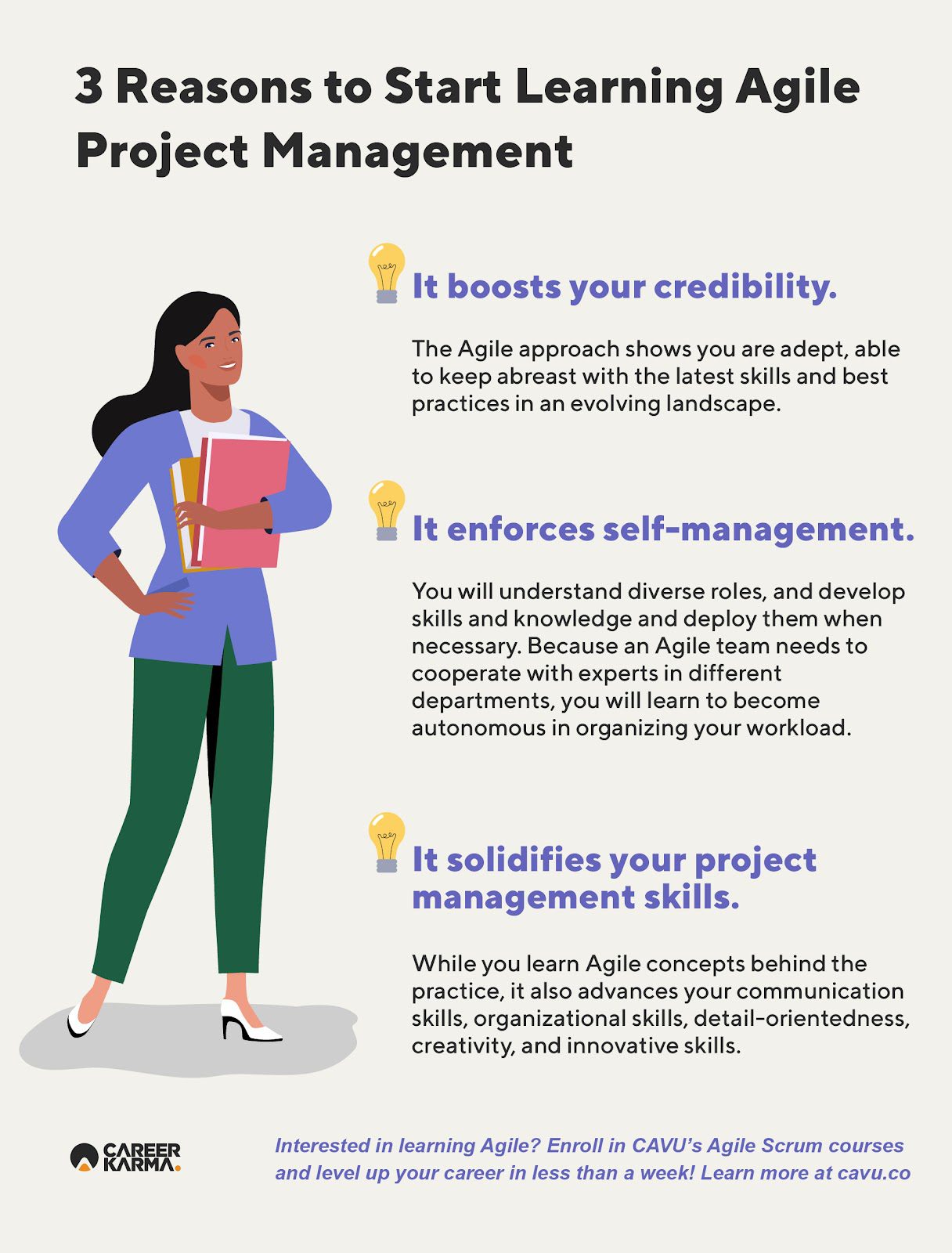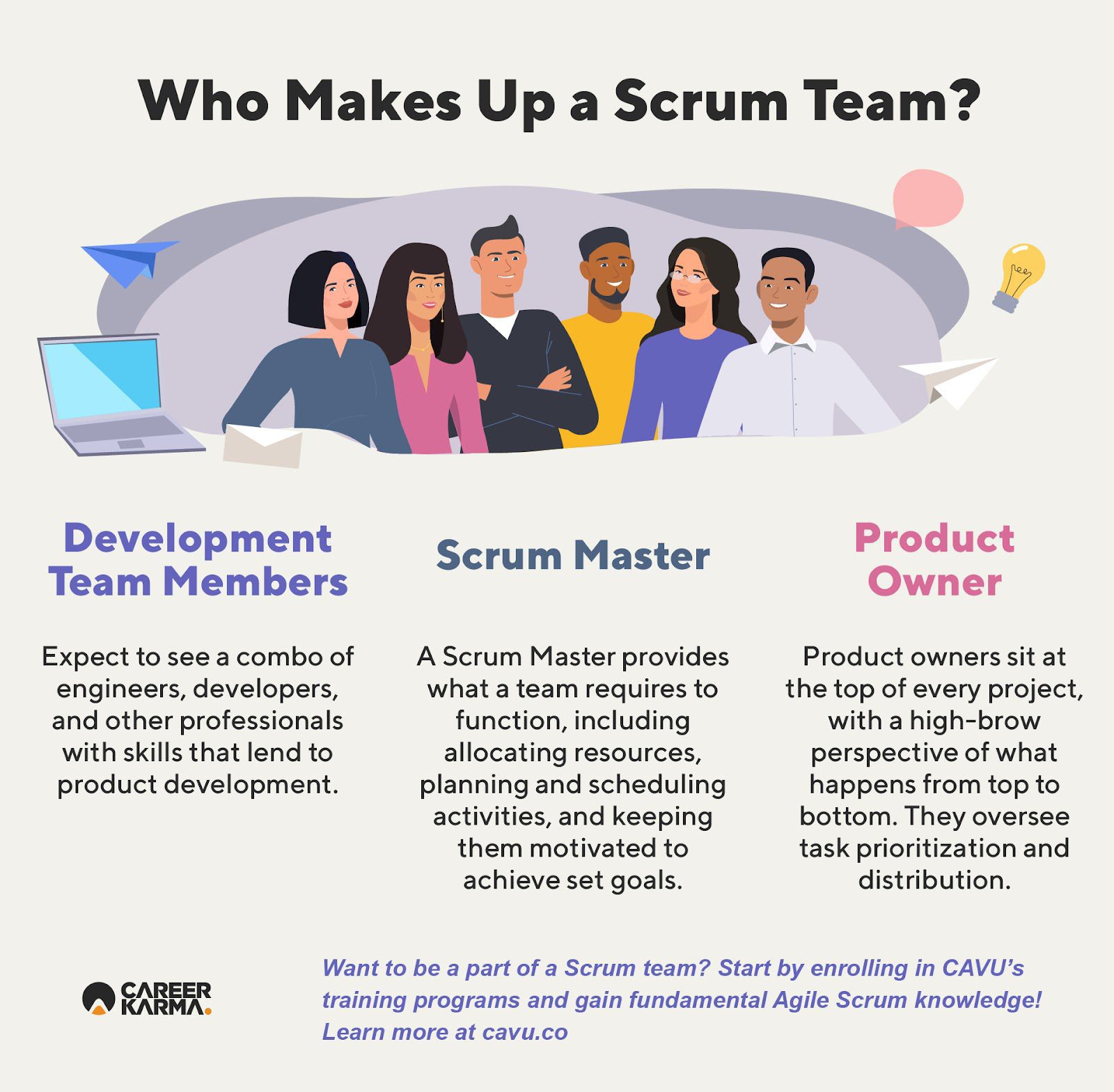Agile has set the standard on how work gets done, and this couldn’t have come at a better time as organizations adapt to a new normal. Primarily seen in software development, the Agile methodology has now spread across multiple businesses and functions like marketing, HR, sales, and finance. Why?
Because the results are too good to miss out on, like:
- Increased productivity across teams
- On-time response to problems and implementation of changes
- Reduction of risks and unnecessary expenses
- Happier customers
- Increased revenue
It makes sense that hiring managers and business leaders are on the hunt for Agile-skilled candidates. And if you want to thrive in an ever-competitive job market, you may find yourself in search of a training ground to learn the ins and outs of Agile sooner than later. Fortunately, social learning platform and benefit corporation CAVU can do that and more!
But First, What Is Agile?
Agile is a philosophy applied in project and product management and across business functions that allows businesses to break a huge deliverable into smaller tasks. A laser-focused team for each task produces high-quality output quicker while optimizing resources and minimizing risks.
Let’s break that down further.
The software development cycle usually begins with research and gathering all the requirements to build the product before a team moves on to design and coding. Once these are complete, product testing eliminates any flaws or bugs. That’s just half the process, which takes months to complete.
By then, customer needs may have changed slightly or even completely. A competitor could have come up with a product that is similar or even better. Stakeholders may start to suggest changes to the product design, creating a need for work to be redone. Consequently, it disrupts the software development cycle and impedes the launch and success of your product.
Enter the Agile approach. With its application in project and product management, businesses can set up dedicated teams to address specific functions in a sprint.
Boost your career and attract exciting opportunities when you complete an Agile and Scrum training course from CAVU.
Click here to get started!3 Reasons Why Agile Is Worth Learning

1. Experience in Agile boosts your credibility.
If working in Fortune 500 Agile companies like Intel, Google, Ericsson, Barclays Bank, and Tesla interests you, earning Agile certifications can be a huge plus when applying. But there’s more to Agile than being an impressive talking point in an interview.
Mastering the Agile approach shows you are an adept professional who keeps abreast of the latest skills and best practices to deal with the ever-changing landscape and succeed in your field. In other words, you gain a competitive edge that sets you apart from your peers.
2. Agile enforces self-management.
To be an Agile professional means embracing lifelong learning and becoming flexible in various tasks. It teaches you to prioritize tasks, understand diverse roles and develop enough skills and knowledge to use them should the need arise.
While working in an Agile team involves cooperating with various experts in different departments, you learn to become autonomous in organizing your workload. This makes you a highly desirable and reliable team player.
3. Learning Agile solidifies your project management skills.
Technical skills are vital in performing complex tasks, but hiring managers value professionals who possess soft skills that make working with others a lot easier, too. After all, an organization cannot function properly if its people and stakeholders clash.
Not only does Agile teach you the concepts behind the practice, but it also advances your communication skills, organizational skills, detail-orientedness, creativity, and innovative skills, too. All these combined will ultimately make you a well-equipped project manager, ready to lead your team to success.
Several methodologies fall under the Agile umbrella, including Scrum, Extreme Programming, Kanban, Crystal, and Dynamic Systems Development Method.
The Agile Scrum Methodology is probably the most commonly used approach because of its versatility and scalability, where organizations of any size can implement it effectively. If this sounds in your wheelhouse, read on as we explore the roles you could fill within a Scrum team and their responsibilities.
Breaking Down the Scrum Roles and Their Responsibilities

1. Scrum Developer
Sometimes seen as a jack-of-all-trades, the development team members are who you can count on to run things on the ground. They are a mix of engineers, developers, and other professionals with extensive skills that lend to the development of products. They specialize in one or two areas and are more broadly skilled in others, allowing them to gain an understanding of roles outside their own and perform different functions when needed.
As a developer, you need to have skills in:
- Conflict resolution
- Time management
- Technical development
- Organization and planning
The result? Quality assurance improves, thereby decreasing mistakes with problems addressed promptly. According to Zippia, development team members take home an $85,639 annual average salary.
2. Scrum Master
Setting up several Scrum teams may mean having four to seven members on each team. And things can get complex pretty quickly, especially in the fast-paced tech sector. As such, each team will have a Scrum Master who can track their progress.
As a Scrum Master, you are in charge of providing what your team needs to function, including allocating resources, planning and scheduling activities, and keeping the team motivated to achieve set goals. That said, you are also an advocate for maintaining a healthy work environment.
Hiring managers are on the lookout for Scrum Masters who are:
- Passionate for developing people
- Experts in the Scrum framework
- Experts in Agile software development
Certified Scrum Masters can earn an average of $103,629 each year. With years of experience, this figure can reach $167,000 annually.
3. Product Owner
Think of Product Owners as the head of every project, having a high-brow perspective of what is happening from top to bottom. They are in charge of the product backlog or the order of tasks according to priority, strategies, and the distribution of these tasks to different teams. Becoming a Product Owner means leading your team to success as efficiently as possible.
While Product Owners should embody most of the skills of development team members and scrum masters, the following are the most vital skills to have:
- Project management
- Analytical skills
- Aligning product development goals with business goals
Given the heavy responsibility, Indeed states that Product Owners receive hefty compensation at an average annual salary of $106,036. If you work in a renowned company and gain solid expertise, you can take home $250,000.
Learn Scrum and Agile at CAVU
The future is promising for aspiring Agile- and Scrum-skilled professionals as you have lucrative career paths to opt for. An excellent first step to your journey is joining CAVU’s next cohort.
Below are a few of CAVU’s course offerings:
- Scrum Bootcamp
- Registered Scrum Master
- Registered Product Owner
- Scrum@Scale Practitioner
In just five days, you can learn what you need to become a Registered Scrum Master and Product Owner when you join the Scrum Bootcamp. The course establishes your fundamental knowledge in the Principles of Agile, Scrum Methodology, Product Vision, and more.
However, if you prefer to immerse in them individually, you can enroll in the instructor-led Registered Scrum Master course or the Registered Product Owner course. Both courses are powered by the Agile Education Program, the industry standard when it comes to providing Agile and Scrum curricula.
You can also learn more about the different roles of a Product Owner, Developer, and Scrum Master in CAVU’s Scrum@Scale Practitioner. This course is designed based on the teachings of Scrum framework co-creator Dr. Jeff Sutherland, packed with lessons you can complete in three days. It deep dives into how you can scale the roles of Scrum Master and Product Owner, resulting in effective cross-team collaboration and improved organizational alignment.
Learn and level up your career in less than a week. Become a CAVU member and start your bootcamp experience!
About us: Career Karma is a platform designed to help job seekers find, research, and connect with job training programs to advance their careers. Learn about the CK publication.




